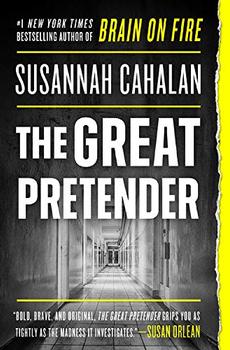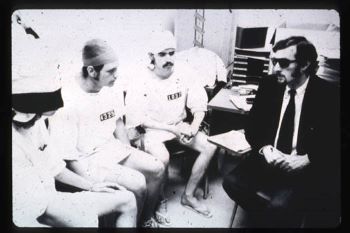Summary | Excerpt | Reading Guide | Reviews | Beyond the Book | Read-Alikes | Genres & Themes | Author Bio
The Undercover Mission That Changed Our Understanding of Madness

Critics' Opinion:
Readers' Opinion:
First Published:
Nov 2019, 400 pages
Paperback:
Jul 2020, 400 pages
 Book Reviewed by:
Book Reviewed by:
Elisabeth Herschbach
Buy This Book
This article relates to The Great Pretender
 In The Great Pretender, former New York Post investigative reporter Susannah Cahalan uncovers evidence that Stanford University psychologist David Rosenhan fabricated at least some of the details in his famous 1973 paper "On Being Sane in Insane Places."
In The Great Pretender, former New York Post investigative reporter Susannah Cahalan uncovers evidence that Stanford University psychologist David Rosenhan fabricated at least some of the details in his famous 1973 paper "On Being Sane in Insane Places."
If true, this certainly wouldn't have been the only time a high profile researcher's work has turned out to be flawed or even downright fraudulent. A particularly brazen example is that of repeat offender Diederik Stapel, a former professor of social psychology at Tilburg University in the Netherlands. Stapel rose to prominence in his field with a series of studies that gained media attention around the world. One study purportedly showed that carnivores are more selfish than vegetarians. Another claimed to show a correlation between dirty, trash-filled environments and racist attitudes. His fame came crashing down in 2011, however, when the university determined that he had been faking his data. So far, a whopping 58 of his publications have been retracted because of fraudulent research.
An even more famous example hits closer to home—in fact, it involves one of Rosenhan's own colleagues at Stanford University, psychology professor Philip Zimbardo. The so-called Stanford Prison Experiment, conducted in 1971, was supposed to test how social roles affect people's behavior. Zimbardo recruited 24 students and randomly assigned them to be either guards or prisoners in a simulated prison on the Stanford campus. The results were shocking, apparently showing that ordinary people could behave with extraordinary cruelty in situations of power.
The prison experiment turned Zimbardo into an instant academic celebrity. The study generated big headlines, and to this day it remains one of the most famous psychological studies of all time, a staple of undergraduate psychology courses. Like Rosenhan's pseudopatient study, Zimbardo's experiment became a catalyst for professional reforms, prompting the American Psychological Association to revise its ethical guidelines for research on human subjects precisely to prohibit the type of research Zimbardo had conducted.
Also like Rosenhan's study, Zimbardo's prison study is now under a cloud of suspicion after new evidence has called into question its scientific integrity. In 2018, journalist Ben Blum published a thoroughgoing exposé based on interviews with study participants and previously unpublished recordings from the experiment. These sources provide convincing evidence that the "guards" were coached to behave more aggressively and the "inmates" were putting on an act—in other words, that the experiment was a fake.
Research fraud is not limited to the field of psychology. Allegations of academic misconduct are rampant across the sciences, from stem-cell research to genetics to food science. In fact, Richard Horton, editor of the prestigious medical journal The Lancet, caused a splash in 2015 when he suggested that perhaps as much as half of the world's scientific literature may be untrue. "Afflicted by studies with small sample sizes, tiny effects, invalid exploratory analyses, and flagrant conflicts of interest, together with an obsession for pursuing fashionable trends of dubious importance, science has taken a turn towards darkness," he wrote.
The consequences of research fraud can be far-reaching and devastating. In 1998, a British doctor named Andrew Wakefield published research that suggested a link between autism and the measles, mumps and rubella (MMR) vaccine, a routine vaccination given to millions of children around the world every year to prevent these highly contagious diseases. Wakefield's research was later found to be fraudulent, and the journal retracted his paper, but not before it helped to fuel a vocal anti-vaccine movement still raging today. As vaccination rates drop, cities around the world have seen increased outbreaks of infectious diseases. Indeed, in 2019, the World Health Organization listed vaccine hesitancy, the decision to forego life-saving vaccines despite their availability, as one of "ten threats to global health."
The Stanford Prison Experiment, via Teodorvasic97/Wikimedia Commons
Filed under Medicine, Science and Tech
![]() This "beyond the book article" relates to The Great Pretender. It originally ran in January 2020 and has been updated for the
July 2020 paperback edition.
Go to magazine.
This "beyond the book article" relates to The Great Pretender. It originally ran in January 2020 and has been updated for the
July 2020 paperback edition.
Go to magazine.





The Flower Sisters
by Michelle Collins Anderson
From the new Fannie Flagg of the Ozarks, a richly-woven story of family, forgiveness, and reinvention.

The House on Biscayne Bay
by Chanel Cleeton
As death stalks a gothic mansion in Miami, the lives of two women intertwine as the past and present collide.

The Funeral Cryer by Wenyan Lu
Debut novelist Wenyan Lu brings us this witty yet profound story about one woman's midlife reawakening in contemporary rural China.
Your guide toexceptional books
BookBrowse seeks out and recommends the best in contemporary fiction and nonfiction—books that not only engage and entertain but also deepen our understanding of ourselves and the world around us.